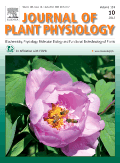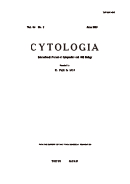
Propagation of Ornamental Plants
Scope & Guideline
Cultivating Knowledge in Ornamental Horticulture
Introduction
Aims and Scopes
- In Vitro Propagation Techniques:
A core focus of the journal is on the development and optimization of in vitro propagation methods, including micropropagation and somatic embryogenesis, which are essential for the rapid and efficient production of ornamental plants. - Plant Growth Regulators:
Research frequently explores the effects of various plant growth regulators (PGRs) such as auxins, cytokinins, and brassinosteroids on plant development, rooting, and shoot proliferation, contributing to improved propagation protocols. - Conservation and Genetic Studies:
The journal addresses the conservation of threatened ornamental species through in vitro techniques, as well as studies on genetic variation and morphogenesis, which are vital for maintaining biodiversity. - Lighting and Environmental Conditions:
Investigations into the impact of different lighting conditions, such as LED lighting, on plant growth and propagation success are featured prominently, reflecting the journal's commitment to optimizing growth environments. - Physiological Mechanisms:
The journal delves into the physiological mechanisms underlying plant responses to various treatments, enhancing the understanding of plant biology and improving propagation practices.
Trending and Emerging
- Use of Biostimulants and Natural Compounds:
There is a growing interest in the application of biostimulants, including seaweed extracts and other natural compounds, to enhance rooting and growth in various species, indicating a trend towards more sustainable and eco-friendly propagation practices. - Advanced Cryopreservation Techniques:
Research into cryopreservation methods for the long-term storage of plant genetic material is emerging as a significant theme, reflecting an increased focus on conservation and the preservation of genetic diversity. - Impact of Environmental Factors on Propagation:
Studies examining the influence of environmental factors, such as light quality and temperature, on propagation success are becoming more prominent, emphasizing the importance of optimizing growth conditions for ornamental plants. - Micropropagation Innovations:
Innovative approaches to micropropagation, including the use of novel substrates and growth conditions, are trending, as researchers seek to improve efficiency and reduce costs in the production of ornamental plants. - Assessment of Genetic Variation:
The use of molecular techniques to assess genetic variation among propagated plant populations is gaining traction, highlighting the importance of genetic studies in enhancing propagation success and plant quality.
Declining or Waning
- Traditional Propagation Methods:
There has been a noticeable decline in research focused on traditional propagation techniques, such as seed propagation and cuttings, as more emphasis is placed on advanced in vitro methods. - Natural Plant Interactions:
Studies exploring natural interactions between plants and their environments, such as symbiotic relationships and ecological propagation strategies, appear to be waning, possibly due to the increasing interest in controlled propagation environments. - Low-Tech Propagation Strategies:
Research involving low-tech or non-scientific propagation methods has diminished, as the journal increasingly emphasizes high-tech solutions and scientific approaches to plant propagation.
Similar Journals

AMERICAN FERN JOURNAL
Advancing Knowledge in Ecology and Plant ScienceAMERICAN FERN JOURNAL, published by AMER FERN SOC INC, is a pivotal resource for researchers and enthusiasts in the fields of Ecology, Evolution, Behavior, and Plant Science. With a publication history dating back to 1993 and extending through 2024, this journal serves as a critical platform for the dissemination of knowledge related to ferns and lycophytes, contributing significantly to taxonomic and ecological studies. While it currently holds a Q4 rank in Ecology, Evolution, Behavior and Systematics and a Q3 rank in Plant Science, the journal continually strives to improve its relevance and impact within the scientific community. Researchers can access its valuable content through conventional subscription models, providing curated articles that advance the understanding of fern biodiversity and conservation. This journal is essential for anyone devoted to the exploration and preservation of these vital plant groups, offering insights that are not only relevant to academic circles but also inspire the broader public to appreciate the beauty and importance of ferns in our ecosystems.

Botanical Studies
Connecting Scholars in the World of BotanyBotanical Studies is a premier open-access journal published by Springer, dedicated to the field of botany and plant sciences. Since its establishment in 2006, the journal has championed innovative research and scholarship that explores diverse botanical topics ranging from plant systematics to ecology and conservation. With a commitment to broad accessibility, it promotes the dissemination of knowledge to researchers, professionals, and students worldwide. Botanical Studies fosters academic collaboration and dialogue, contributing significantly to the global botanical community. Its open-access policy allows unrestricted access to its high-quality, peer-reviewed content, ensuring that vital research is available to all. Join the growing community of scholars advancing botanical science through this essential publication, conveniently located at One New York Plaza, Suite 4600, New York, NY 10004, United States.

Light & Engineering
Illuminating the Future of EngineeringLight & Engineering is a prominent academic journal dedicated to the field of electrical and electronic engineering, published by ZNACK PUBLISHING HOUSE in the Russian Federation. Since its inception in 2008, the journal has been a valuable resource for researchers, professionals, and students seeking to advance their understanding of innovative technologies and methodologies in light engineering. With an HIndex that reflects the journal's contribution to the field, it holds a respectable Q3 classification in the 2023 category for Electrical and Electronic Engineering within Scopus rankings, indicating a growing influence and visibility. While currently not available as open access, the journal's content spans a range of pertinent topics that drive technological progress and scientific inquiry. Operating from PO BOX 648, 10100 MOSCOW, RUSSIA, it continuously strives to disseminate impactful research and foster collaborations within the scientific community. As the journal looks toward 2024, it remains committed to highlighting the critical intersections of light and engineering, making it an essential publication for anyone invested in these evolving fields.

Scientific Papers-Series B-Horticulture
Nurturing Ideas, Harvesting Solutions in Horticulture.Scientific Papers-Series B-Horticulture is a distinguished open-access journal published by the University of Agronomic Sciences and Veterinary Medicine Bucharest. With its ISSN 2285-5653 and E-ISSN 2286-1580, this journal has been accessible to the global research community since 2002, ensuring that vital horticultural research reaches a wide audience without barriers. Positioned at the forefront of the horticultural sciences, the journal serves as a platform for original research, reviews, and innovations pertaining to horticultural practices, plant physiology, and sustainable agriculture. Its contributions are not just significant in Romania but also resonate through the international scientific community, helping to address pressing agricultural challenges. The office located at 59 Marasti Boulevard, District 1, Bucharest 011464, Romania, symbolizes its commitment to advancing horticultural knowledge and fostering collaboration among researchers, professionals, and students alike. With no current H-index data, the journal invites continued contributions to enhance its visibility and impact in the field.

PAKISTAN JOURNAL OF BOTANY
Unlocking Nature's Secrets: The Science of BotanyPakistan Journal of Botany, published by the Pakistan Botanical Society, is a leading platform for the dissemination of high-quality research in the field of plant sciences. Established in 1978 and with its most recent issues available until 2024, this journal has been pivotal in enhancing our understanding of botany, particularly in the South Asian context. With an ISSN of 0556-3321 and E-ISSN of 2070-3368, it serves a global readership, appealing to researchers, practitioners, and students alike. The journal is ranked in Q3 of the Plant Science category for 2023, indicating its scholarly significance, and it holds a position in the 51st percentile of its Scopus ranking. While currently offering limited open access, the journal continues to strive for broader accessibility to foster knowledge dissemination. Research published in the Pakistan Journal of Botany covers diverse topics, including but not limited to plant physiology, ecology, and conservation, making it an invaluable resource for anyone engaged in plant science research.

JOURNAL OF PLANT PHYSIOLOGY
Unveiling the Secrets of Plant PhysiologyJOURNAL OF PLANT PHYSIOLOGY, published by ELSEVIER GMBH, stands as a leading international journal dedicated to the field of plant physiology, agronomy, and crop science. With an impressive impact factor and recognition within the Q1 and Q2 quartiles across various categories, this journal consistently ranks among the top in its field—positioned at #65/516 in Plant Science and #52/406 in Agronomy and Crop Science as of 2023. Located in Munich, Germany, it serves as a vital platform for researchers, practitioners, and students to share groundbreaking insights and advancements. Although it does not currently offer open access, the journal provides an essential repository of knowledge, publishing significant original research, reviews, and discussions on plant function, regulation, and development, thereby shaping the future of agricultural practices and contributing to our understanding of biophysical processes. Researchers looking to publish in a reputable venue or to access cutting-edge studies will find JOURNAL OF PLANT PHYSIOLOGY an invaluable resource.

Gesunde Pflanzen
Cultivating Knowledge for Future AgricultureGesunde Pflanzen is a prestigious peer-reviewed journal published by Springer, based in Germany. Specializing in the fields of agricultural and biological sciences, this journal has established itself as an essential resource for researchers, professionals, and students interested in plant health and pathology. With an impressive impact factor in the Q2 category, ranking 73 out of 221 within the general agricultural and biological sciences field (67th percentile as of 2023), Gesunde Pflanzen offers invaluable insights into current trends, challenges, and breakthroughs in plant research. The journal has been consistently publishing academic contributions since its inception in 1974, fostering advancements in agricultural practices and promoting sustainable plant health management strategies. While the journal does not currently offer open access options, its rigorous peer-review process ensures that published articles maintain high standards of scientific integrity and relevance. Researchers and professionals in the field are encouraged to engage with this journal to stay abreast of the latest findings and methodologies shaping the future of agriculture.

Tropical Plant Biology
Unveiling the Secrets of Tropical Plant LifeTropical Plant Biology is a premier academic journal published by Springer, dedicated to advancing the understanding of tropical plants and their ecological significance. With an ISSN of 1935-9756 and an E-ISSN of 1935-9764, this journal serves as a vital platform for researchers, professionals, and students focused on the fields of Genetics and Plant Science. Notably recognized in 2023 as a Q2 journal in Plant Science and Q3 in Genetics, it ranks 171st out of 516 in Agricultural and Biological Sciences and 227th out of 347 in Genetics according to Scopus. The journal encompasses a diverse range of topics, offering insights into tropical plant biology, ecology, conservation, and biodiversity. Although it does not currently operate under an open-access model, it remains an essential resource for anyone passionate about tropical ecosystems and their intricate relationships. With contributions spanning from 2009 to 2024, Tropical Plant Biology continues to foster scholarly discourse and innovation in the field.

CYTOLOGIA
Bridging the Gap Between Basic and Applied SciencesCYTOLOGIA is a prominent academic journal published by University of Tokyo Cytologia, specializing in the fields of Animal Science, Plant Science, Cell Biology, and Genetics. With origins dating back to 1929, this journal has been at the forefront of cytological research and continues to contribute to advancements in both basic and applied sciences. As of 2023, it holds a respectable position in various Scopus categories, with a Q3 ranking in Animal Science and Zoology and Plant Science, alongside Q4 rankings in Genetics and Cell Biology, reflecting its dedication to quality research dissemination. While currently not an Open Access journal, CYTOLOGIA provides critical insights and findings that are pivotal for researchers, professionals, and students aiming to further their understanding of cytology and its applications in diverse biological fields. With a historical legacy and ongoing relevance, CYTOLOGIA remains a vital resource for anyone engaged in cutting-edge research or seeking comprehensive knowledge in the biological sciences.

Annali di Botanica
Exploring the depths of plant sciences with open access.Annali di Botanica is a distinguished journal published by UNIV STUDI ROMA LA SAPIENZA that has become a vital platform for advancing research in the field of plant sciences. With its Open Access policy established since 1995, it ensures that a wide audience including researchers, professionals, and students can access high-quality, peer-reviewed articles that contribute to the global body of botanical knowledge. As of 2023, the journal holds a Q3 rank in the Plant Science category, reflecting its commitment to scholarly excellence and relevance, as evidenced by its position within the 62nd percentile of activities ranked in Scopus. The journal encompasses diverse topics in botany, fostering discussions that encompass morphological, ecological, and genetic aspects of plants, effectively bridging theoretical knowledge and practical applications. Situated in the heart of Rome, Italy, at PIAZZALE ALDO MORO, 5, the journal not only addresses regional botanical issues but aims to serve a global audience, enhancing collaborative efforts and stimulating innovation across the botanical sciences.